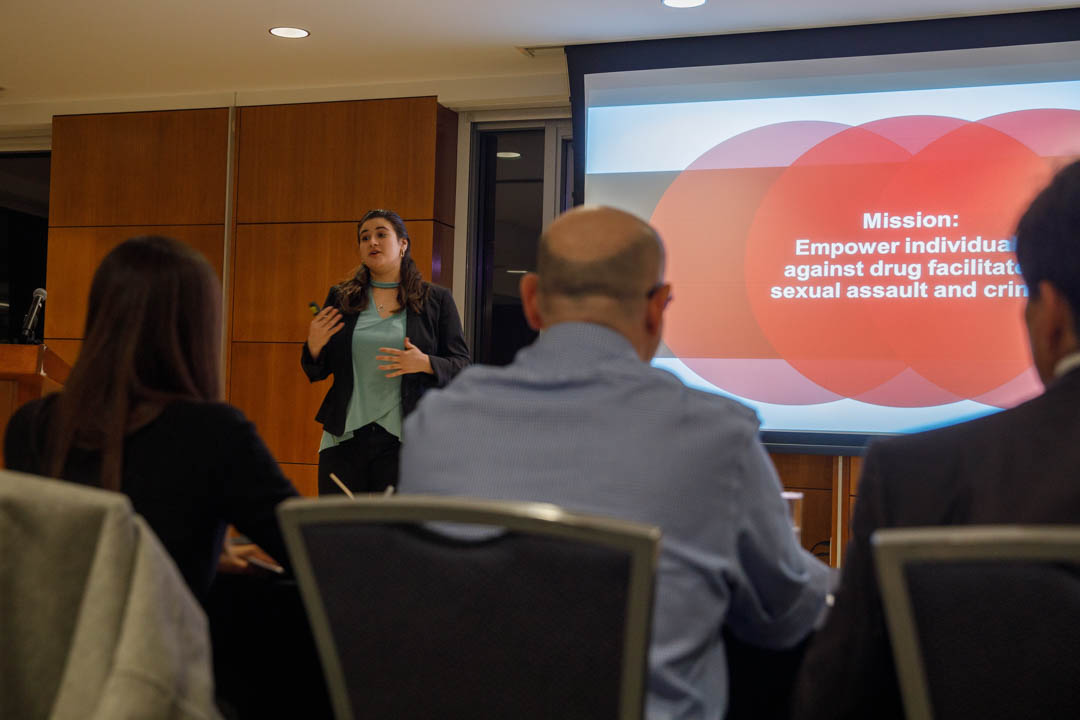By Tatyana Hopkins
Ten George Washington University entrepreneurs pitched startup ideas ranging from a tool that allows patients to self-administer diagnostic blood tests to interactive storage solutions for luxury investments at a Pitch Night contest Tuesday that marked the launch of GW’s partnership with eMerge Americas, the premier technology event that links Latin America to the rest of the world.
“The genesis of eMerge Americas began with building out a technology conference to connect startups with global enterprises and international investors,” said Manuel D. Medina, founder and chairman of the board of eMerge Americas and CEO of Cyxtera Technologies, which operates the Cyxtera Federal Group in Washington, D.C. “After nearly six years, we’ve expanded our talent pipeline to include startups from across the Americas, and we are very pleased to partner with the George Washington University, which has a renowned incubator program.”
The pitch competition held in the Elliott School of International Affairs’ City View Room was organized to fast-track at least two GW teams to the sixth annual eMerge Americas Startup Showcase in April in Miami.
In addition to the GW teams that will compete in Miami in April, the university will also unveil an exhibition at the event highlighting faculty research in technology, policy and cybersecurity and GW President Thomas LeBlanc will host a keynote discussion at the eMerge Americas eGOV Summit. Held during the conference, the summit brings together top government officials and business leaders from around the world to explore public-private partnerships and how disruptive technology can be leveraged to transform communities.
"Through the eMerge Americas conference, GW will be able to showcase our growing strengths in science, technology and engineering,” Dr. LeBlanc said. “In addition, some of our top student innovators and entrepreneurs will have an opportunity to pitch their ideas on a global stage. We are looking forward to sharing GW’s expertise with new audiences through this partnership."
The judges, which included university trustees and eMerge Americas leadership, sought the best and most innovative digital solutions to problems in industries including health, finance, education and artificial intelligence. They selected three teams to move onto the larger competition in the spring:
-
KnoNap – a cocktail napkin that, upon saturation, is capable of indicating the presence of select date rape drugs.
-
Nanochon – a startup that creates 3D-printed knee cartilage implants.
-
M-Size Me – a ground-breaking digital obesity management tool designed to help doctors visually explain an obesity diagnosis and to help teens achieve their weight-loss goals.
The GW teams presented five-minute pitches of their products and services to a panel of judges consisting of eMerge Americas President Melissa Medina and three members of the GW Board of Trustees—Chair Nelson A. Carbonell Jr., B.S. ’85; Amr A. ElSawy, MSEE ’81; and Todd Klein.
Dr. LeBlanc kicked off the competition, noting in his opening remarks the enthusiasm the partnership has sparked.
In announcing the winners, Ms. Medina said the judges’ decision was “very difficult to make.”
“I couldn't be prouder to be here among such incredible entrepreneurs,” she said.
Ben Holmes, a third-year medical student, made the winning pitch for Nanochon, a startup that developed 3D-printed knee cartilage implants that could offer a less invasive and effective alternative for millions of young patients who do not qualify for total knee replacement surgery, which is usually reserved for people in their late 50s and early 60s.
The implant would help replace lost and damaged tissues as well as encourage growth of new cartilage in the knee.
“We have a very unmet need,” Mr. Holmes said. “There are a lot of solutions, but none of them are very good.”
Yolandra Hancock, an adjunct faculty member at the Milken Institute School of Public Health and a pediatrician, was selected for her digital obesity management tool, M-Size Me. It was designed to help doctors visually explain an obesity diagnosis and help teens achieve their weight goals.
Elliott School senior Danya Sherman also won after pitching KnoNap, a discreet and disposable cocktail napkin that is capable of detecting the presence of select date rape drugs.
Ms. Medina said one of the most important components of a thriving technology ecosystem was higher education and that eMerge Americas would connect GW teams with “global thought-leaders and investors.”
“The heart and soul of eMerge Americas is supporting entrepreneurship,” Ms. Medina said. “We are a global convening of innovators, investors, entrepreneurs, business executives and government officials from all over the world with the purpose of discussing technology that is transforming our lives and transforming industries.”
The winning teams will compete against more than 100 other companies in the global startup showcase April 29-30, which will also offer two days of interactive experiences and networking events. Additionally, they will have access to seven virtual and one in-person boot-camps leading up to the competition to refine their pitch skills.
Prizes at the larger competition will include a Google Cloud startup package that includes $100,000 in Cloud and Firebase credits and access to exclusive events and mentoring opportunities; $10,000 in American Airlines travel credits; and the opportunity to meet with Michael Seibel, a partner at the Silicon Valley startup incubator Y Combinator. Teams also have the opportunity to secure a booth at future eMerge Americas, as well as promotion and marketing through its marketing channels.
Felice Gorordo, eMerge America CEO, said he was honored to partner with GW.
“The next great ideas are not going to come from San Francisco, New York, Boston or Austin. They are going to come from emerging ecosystems like here, and like ours in Miami,” Mr. Gorordo said. “That’s why we’re so excited about our partnership with GW.”





